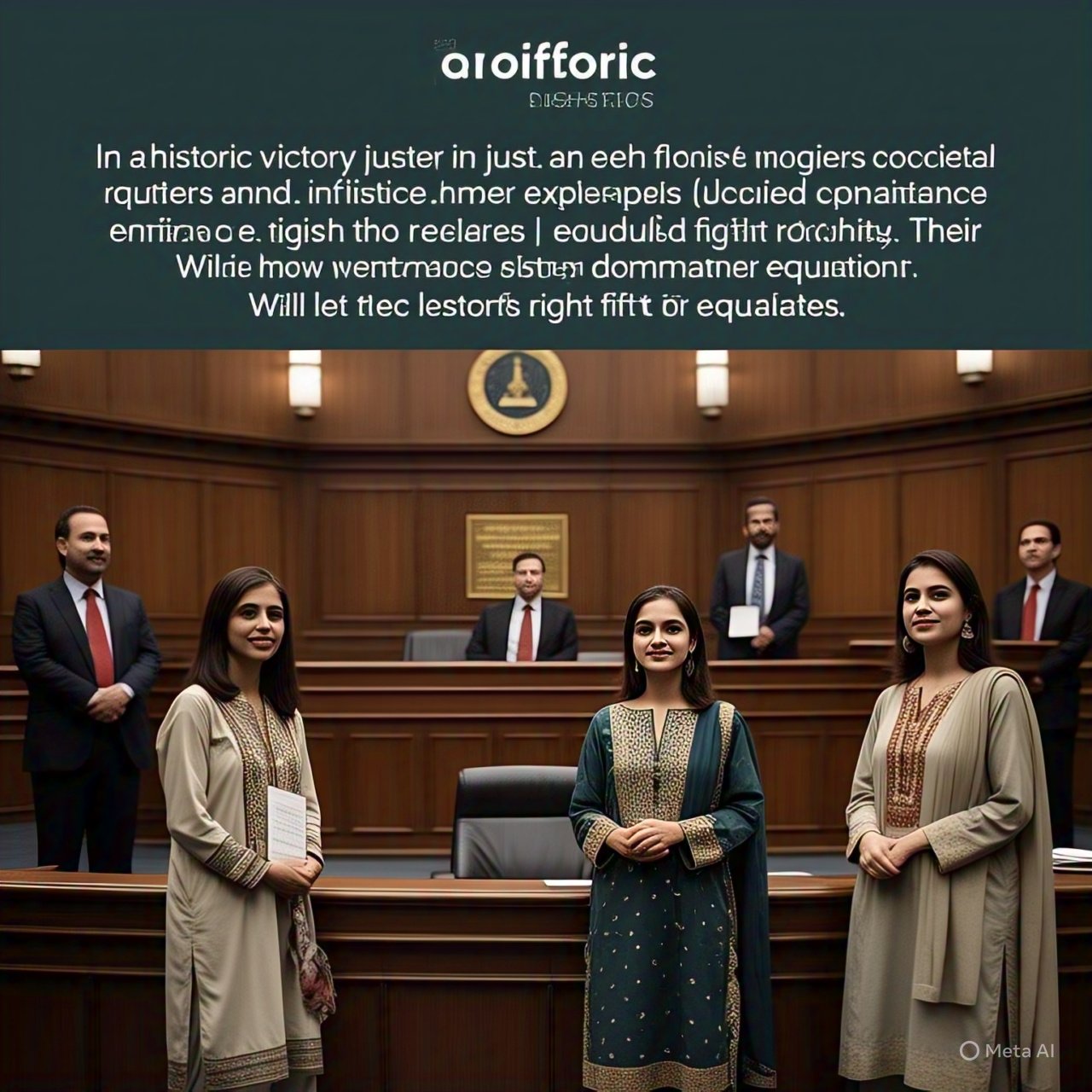
A Historic Judicial Decision: An Analytical Blog Shedding Light on Khula and Marriage Rights
Introduction
This is the story of Sohail Ahmed and Samreen Rashid, who found themselves on opposite sides of a prolonged legal battle over their marriage and the right to khula (divorce initiated by the wife). Their story not only highlights marital discord but also serves as a clear testament to how far Pakistan’s judicial system can go to protect women’s rights in such matters. Sohail Ahmed, a Pakistani citizen, and Samreen Rashid, who holds dual citizenship in Pakistan and the United States, found their dispute intensifying when Samreen filed for divorce through khula in the Family Court, and Sohail challenged the jurisdiction of Pakistani courts.
ایک تاریخی عدالتی فیصلہ: خلع اور شادی کے حقوق پر روشنی ڈالنے والا تجزیاتی بلاگ
یہ کہانی سہیل احمد اور سمرینہ رشید کی ہے، جو اپنی شادی اور خلع کے حق کے حوالے سے طویل قانونی جنگ میں ایک دوسرے کے مد مقابل کھڑے تھے۔ ان کی کہانی نہ صرف ازدواجی اختلافات کو اجاگر کرتی ہے بلکہ اس بات کا بھی واضح ثبوت فراہم کرتی ہے کہ پاکستان کا عدالتی نظام ایسے معاملات میں خواتین کے حقوق کے تحفظ کے لیے کس حد تک جا سکتا ہے۔ سہیل احمد، پاکستان کے شہری، اور سمرینہ رشید، جو کہ پاکستان اور امریکہ کی دوہری شہریت رکھتی ہیں، کے درمیان یہ تنازعہ اس وقت شدت اختیار کر گیا جب سمرینہ نے فیملی کورٹ میں خلع کے ذریعے طلاق کی درخواست دی اور سہیل احمد نے پاکستانی عدالتوں کے دائرہ اختیار کو چیلنج کیا۔
| عدالتی فیصلہ پر اردو بلاگ | |||||
| عدالتی فیصلے کا حوالہ نمبر | 2024SCMR634 | Dissolution Of Marriage, Khula خلع، تنسیخ نکاح | |||
| کس عدالت نے کیس سنا | سپریم کورٹ آف پاکستان | ||||
| جن جسٹس صاحبان نے کیس سنا | محمد علی مظہر ، سید حسن اظہر رضوی اور عرفان سعادت خان | ||||
| جوابی درخواست گزاران | درخواست گزاران | ||||
| مسماة سمرینہ رشید میمن اور دیگر — جواب دہندگان | بنام | سہیل احمد — درخواست گزار | |||
| فیصلہ لکھنے والا جسٹس | سید حسن اظہر رضوی | ||||
Background: The Beginning of the Story
Samreen Rashid and Sohail Ahmed married in the United States under Islamic law, where the dower (mehr) was set at $5,000. Unfortunately, within a few months of their marriage, their relationship soured, and Sohail returned to Pakistan. Samreen, through her lawyer, filed a case in Pakistan’s Family Court for khula and maintenance (nafaqa). At this point, Sohail argued in court that since their marriage took place in the United States and all issues arose there, Pakistani courts did not have jurisdiction over the case.
پس منظر: کہانی کی شروعات
سمرین رشید اور سہیل احمد نے امریکہ میں اسلامی قوانین کے تحت شادی کی، جہاں حق مہر 5000 امریکی ڈالر مقرر کیا گیا تھا۔ بدقسمتی سے، شادی کے چند ماہ بعد ہی ان کے تعلقات میں تلخیاں آ گئیں، اور سہیل احمد پاکستان واپس آ گئے۔ سمرینہ نے اپنے وکیل کے ذریعے پاکستان کی فیملی کورٹ میں خلع اور نان و نفقہ کے لیے مقدمہ دائر کیا۔ اس موقع پر، سہیل نے عدالت میں مؤقف اختیار کیا کہ چونکہ ان کی شادی امریکہ میں ہوئی اور تمام مسائل وہاں پیدا ہوئے، اس لیے پاکستانی عدالت کو اس مقدمے کی سماعت کا اختیار نہیں ہے۔
Legal Context: Jurisdiction of the Court
According to Rule 6 of the Family Courts Rules 1965 in Pakistan, the Family Court has jurisdiction over cases where the cause of action arises partially or wholly, or where the parties last resided together. It further states that in cases of dissolution of marriage and dower, the court has jurisdiction where the wife ordinarily resides. Samreen Rashid’s case fit this principle, as she frequently visited Pakistan and completed her education in Karachi.
قانونی تناظر: عدالت کا دائرہ اختیار
پاکستان کے فیملی کورٹس رولز 1965 کے قاعدہ 6 کے مطابق، پاکستانی فیملی کورٹ کو اس مقدمے کی سماعت کا اختیار ہے جہاں دعویٰ کا سبب جزوی یا مکمل طور پر پیدا ہو یا جہاں فریقین آخری بار اکٹھے رہے ہوں۔ اس میں مزید یہ بھی کہا گیا ہے کہ تنسیخ نکاح اور حق مہر کے مقدمات میں عدالت اس جگہ کا دائرہ اختیار رکھتی ہے جہاں بیوی عام طور پر مقیم ہو۔ سمرینہ رشید کا کیس اس اصول پر پورا اترتا تھا، کیونکہ وہ اکثر پاکستان آتی رہی ہیں اور اپنی تعلیم کراچی میں حاصل کی۔
Arguments of the Lawyers
Sohail Ahmed’s Lawyer:
Sohail Ahmed’s lawyer argued that Pakistani courts did not have jurisdiction over the case since the marriage took place in the United States and should be resolved under U.S. law. They contended that since Samreen resided in the United States, pursuing the case in a Pakistani court would be unlawful.
Samreen Rashid’s Lawyer:
Samreen Rashid’s lawyer maintained that Pakistani Family Courts had full jurisdiction under the law, as Samreen was also a Pakistani citizen and frequently visited Pakistan. They argued that facilitating judicial jurisdiction in favor of the wife aligns with the spirit of the law to ensure women have easier access to justice.
وکلاء کے دلائل
سہیل احمد کے وکیل نے دلیل دی کہ پاکستانی عدالتوں کے پاس اس مقدمے کا دائرہ اختیار نہیں ہے کیونکہ شادی امریکہ میں ہوئی اور وہاں کے قوانین کے تحت اس کا حل ہونا چاہیے۔ ان کا مؤقف تھا کہ چونکہ سمرینہ امریکہ میں مقیم ہیں، اس لیے پاکستان کی عدالت میں یہ کیس چلانا غیر قانونی ہوگا۔
سمرینہ رشید کے وکیل
سمرینہ رشید کے وکیل نے مؤقف اپنایا کہ پاکستانی فیملی کورٹس کو قانون کے تحت اس مقدمے کی سماعت کا مکمل اختیار حاصل ہے کیونکہ سمرینہ ایک پاکستانی شہری بھی ہیں اور اکثر پاکستان آتی ہیں۔ انہوں نے دلیل دی کہ بیوی کے حق میں عدالتی دائرہ اختیار کی سہولت رکھنا قانون کی روح کے مطابق ہے تاکہ خواتین کو انصاف کے حصول میں آسانی ہو۔
Court’s Decision: A Historic Example in Favor of Women’s Rights
After carefully considering both parties’ arguments, the court ruled that Pakistani Family Courts had full jurisdiction over the case. The court clarified that in khula cases, the wife’s place of residence is given importance to ensure she can easily approach the court to secure her rights. The court further stated that issues of khula and marriage should be resolved in accordance with Islamic principles to allow both parties the opportunity to lead a harmonious life.
Legal Perspective: The Right to Khula and Islamic Law
Pakistani courts have maintained that the purpose of the Family Courts Act, 1964, is to provide prompt and effective resolution of family disputes. Under this law, courts are granted special authority in khula cases to issue preliminary decrees if reconciliation fails. According to Islam, if a woman cannot lead a happy life with her husband, she has the right to seek khula.
عدالت کا فیصلہ: خواتین کے حقوق کے حق میں ایک تاریخی مثال
عدالت نے دونوں فریقین کے دلائل کو غور سے سننے کے بعد فیصلہ دیا کہ پاکستانی فیملی کورٹس کو اس مقدمے کی سماعت کا مکمل اختیار حاصل ہے۔ عدالت نے واضح کیا کہ خلع کے معاملے میں بیوی کے مقامی رہائش کی جگہ کو اہمیت دی گئی ہے تاکہ وہ اپنے حقوق کے لیے آسانی سے عدالت سے رجوع کر سکے۔ عدالت نے مزید کہا کہ خلع اور شادی کے مسائل اسلام کے اصولوں کے مطابق حل کیے جانے چاہییں تاکہ فریقین کو خوشگوار زندگی گزارنے کا موقع ملے۔
قانونی نقطہ نظر: خلع کا حق اور اسلامی قانون
پاکستانی عدالتوں نے یہ موقف اپنایا کہ فیملی کورٹس ایکٹ، 1964 کا مقصد عائلی تنازعات کا فوری اور مؤثر حل فراہم کرنا ہے۔ اس قانون کے تحت، عدالتوں کو خلع کے مقدمات میں خصوصی اختیار دیا گیا ہے کہ وہ اگر مفاہمت ناکام ہو جائے تو خلع کا ابتدائی فرمان جاری کر سکتی ہیں۔ اسلام کے مطابق، اگر کوئی عورت اپنے شوہر کے ساتھ خوشگوار زندگی نہیں گزار سکتی تو اسے خلع کا حق حاصل ہے۔
Impact of the Decision: Social and Legal Change
This decision is a strong example of the protection of women’s rights in Pakistan. The court emphasized the importance of simplifying the judicial process for wives to safeguard their rights. This ruling marks a significant step toward protecting women’s rights and demonstrates that courts are serious about granting women their due rights while adhering to Islamic and legal principles.
State’s Responsibility: Protecting Women’s Rights
The court also stated that it is the state’s responsibility to provide legal facilities to women so they can approach the courts against any form of oppression or injustice. The court stressed that Islam prioritizes women’s rights and that marriage is a relationship where both parties should have equal status.
فیصلے کے اثرات: معاشرتی اور قانونی تبدیلی
یہ فیصلہ پاکستانی خواتین کے حقوق کی ایک مضبوط مثال ہے۔ عدالت نے اس کیس میں واضح کیا کہ بیوی کے لیے عدالتی عمل کو آسان بنانا اہم ہے تاکہ وہ اپنے حقوق کا تحفظ کر سکے۔ یہ فیصلہ خواتین کے حقوق کے تحفظ کی طرف ایک اہم قدم ہے اور اس سے ظاہر ہوتا ہے کہ عدالتیں اسلامی اور قانونی اصولوں کو مدنظر رکھتے ہوئے خواتین کو ان کے جائز حقوق دینے کے لیے سنجیدہ ہیں۔
ریاست کی ذمہ داری: خواتین کے حقوق کا تحفظ
عدالت نے یہ بھی کہا کہ ریاست کی ذمہ داری ہے کہ وہ خواتین کو قانونی سہولتیں فراہم کرے تاکہ وہ کسی بھی قسم کی ظلم و زیادتی کے خلاف عدالت کا دروازہ کھٹکھٹا سکیں۔ عدالت نے زور دیا کہ اسلام خواتین کے حقوق کو ترجیح دیتا ہے اور شادی ایک ایسا رشتہ ہے جس میں دونوں فریقین کو برابری کا درجہ حاصل ہونا چاہیے۔
Concluding Thoughts: A Message for Citizens
This decision serves as a lesson for every citizen of Pakistan to trust the judicial system for the protection of their rights. Women should approach the courts to secure their rights and not fear legal battles. This judicial decision teaches us that courts protect our rights and strive to deliver justice. Every citizen should remember that the law is equal for all, and if you are in the right, the courts will provide you with justice.
اختتامی خیالات: شہریوں کے لیے پیغام
یہ فیصلہ پاکستان کے ہر شہری کے لیے ایک سبق ہے کہ وہ اپنے حقوق کے تحفظ کے لیے عدالتی نظام پر بھروسہ کریں۔ خواتین کو چاہیے کہ وہ اپنے حق کے لیے عدالت سے رجوع کریں اور قانونی جدوجہد سے نہ گھبرائیں۔ یہ عدالتی فیصلہ ہمیں یہ سکھاتا ہے کہ عدالتیں ہمارے حقوق کا تحفظ کرتی ہیں اور ہمیں انصاف فراہم کرنے کے لیے کوشاں ہیں۔ ہر شہری کو یہ بات ذہن نشین رکھنی چاہیے کہ قانون سب کے لیے برابر ہے اور اگر آپ حق پر ہیں تو عدالتیں آپ کو انصاف فراہم کریں گی۔





